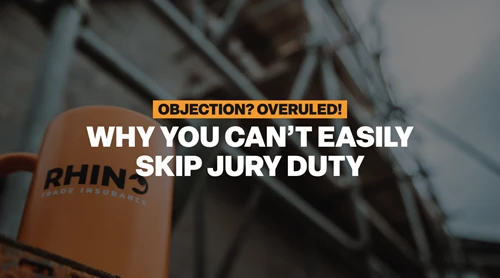If you're drowning in paperwork as a tradesperson, you're not alone. Running a trade business is no small feat, and when it comes to managing finances, it can feel like you're navigating a labyrinth. Fear not, because today, Rhino is diving into the world of payslips - those bits of paper that turn sweat and toil into cold, hard cash. Here, we'll unravel the mystery behind creating payslips for your trade business, ensuring you stay on the right side of the taxman and keep your team happy.
The Importance of Payslips
Before we roll up our sleeves and get into the nitty-gritty of payslip creation, let's understand why these little pieces of paper are so crucial. Payslips are more than just a record of how much money your team takes home each month. They serve as a legal document, offering transparency and protection for both employers and employees.
For tradespeople, payslips help maintain a healthy working relationship by clearly outlining wages, deductions, and tax contributions. They also play a vital role in demonstrating compliance with HMRC regulations, making sure you’re compliant when it comes to tax audits.
Knowing Your Legal Obligations
Now that we've established the importance of payslips, it's time to get familiar with the legal obligations that come with them. As a tradesperson running a business, you are required by law to provide payslips to your employees. Failure to do so can result in fines and legal consequences.
Your payslips must include certain key information, such as:
- Employee's name and address
- Employer's name and address
- Payment date
- Pay period
- Total gross pay
- Total deductions (tax, National Insurance, etc.)
- Net pay (take-home pay)
- Make sure your payslips are accurate and timely, as discrepancies can lead to disgruntled employees and potential legal troubles.
Choosing the Right Payslip Format
Now that you understand the legal requirements, it's time to choose a payslip format that suits your trade business. There are various options available, from traditional paper payslips to electronic formats. Consider your team size, your budget, and your employees' preferences when making this decision.
Paper payslips are the classic choice, but in our tech-savvy age, electronic payslips offer convenience and efficiency. They also reduce the risk of human error associated with manual calculations and they’re much harder to lose! Explore payroll software options that align with your trade business size and needs, and ensure they are HMRC compliant.
Setting Up an Efficient Payroll System
To create accurate payslips, you need an efficient payroll system in place. This involves keeping meticulous records of working hours, overtime, and any additional payments or deductions. Consider investing in payroll software (something like Quickbooks or SAGE) that automates these processes, saving you time and reducing the risk of errors.
On top of that, ensure that you're well-versed in tax regulations, including income tax and National Insurance contributions. Staying in the loop of these obligations will not only help you create accurate payslips but will also keep the taxman at bay - if you ever have any tax bother, you can always take out tax enquiry insurance that forms a protective barrier between you and the tax office!
Breaking Down the Payslip Components
Now, let's break down the anatomy of a payslip. Understanding each component ensures that your payslips are comprehensive and comply with legal standards.
Employee Information: Include the employee's full name and address, ensuring that it matches the details on their employment contract.
Employer Information: Clearly state your business name and address. This helps avoid any confusion, especially if you have multiple trade businesses.
Payment Date and Pay Period: Clearly mention the date the payment is made and the corresponding pay period. This helps employees track their income and understand the time frame for which they are being paid.
Gross Pay: This is the total amount your employee earns before any deductions. It includes regular wages, overtime, and any bonuses or allowances.
Deductions: Break down all deductions, including income tax, National Insurance contributions, and any other deductions agreed upon with the employee. Ensure that these deductions are calculated correctly to avoid discrepancies.
Net Pay: The net pay is what the employee takes home after all deductions. This is the amount they can expect to see in their bank account.
Don't forget that it's a legal obligation to hold the right level of employers' liability insurance if you hire staff members. At Rhino Trade Insurance, you can take out cover up to £10 million, which protects you in case an employee gets ill or injured as a result of their work. Find out all about our cost-effective cover here.
Handling Overtime and Additional Payments
For tradespeople, overtime is often the norm rather than the exception. When it comes to creating payslips, it's crucial to accurately reflect any overtime hours worked and the additional payment associated with them.
Ensure that your payroll system is equipped to handle overtime calculations. Whether you pay time-and-a-half or double time for overtime hours, clearly outline these rates on the payslip. This transparency helps build trust and avoids any confusion among your team.
Similarly, if you provide bonuses, allowances, or reimbursements, ensure that these are clearly stated on the payslip. Transparency is key to maintaining a positive employer-employee relationship.
Staying HMRC Compliant
HMRC regulations can be a maze, but navigating them is essential for a smooth business operation. Make sure your payroll system is HMRC compliant and that you're up to date with any changes in tax codes or contribution rates.
Regularly review your payroll processes to stay in line with HMRC guidelines. This not only ensures legal compliance but also prevents any unwelcome surprises during tax audits.
Outsourcing Payroll Services
As your trade business grows, so do your responsibilities. Managing payroll can become increasingly complex, especially if you have a larger team. In this case, outsourcing payroll services might be a smart move.
Outsourcing allows you to concentrate on what you do best - running your trade business and working on projects – while the money experts handle payroll. Look for reputable payroll service providers local to you with experience in the trades industry to ensure a seamless transition and accurate payroll processing.
Troubleshooting Payslip Discrepancies
Even with the best systems in place, errors can occur. If you or your team notice any discrepancies on a payslip, it's essential to address them promptly. Open communication is key here. Encourage your team to bring any concerns to your attention and be proactive in resolving issues. Also, regularly audit your payroll processes to catch any errors before they become bigger problems. This not only ensures accurate payslips but also prevents potential legal headaches down the line.
Get Covered With Rhino Trade Insurance
So, there's the secret to mastering the art of payslips for your trade business. From understanding the legal obligations to choosing the right format and creating transparent and accurate payslips, you're well-equipped to navigate the complex world of payroll.
Ready to safeguard your trade business? Don't leave it to chance - get your trade insurance sorted with Rhino Trade Insurance today by calling 0116 243 7904 and build a rock-solid foundation for your business's success!




